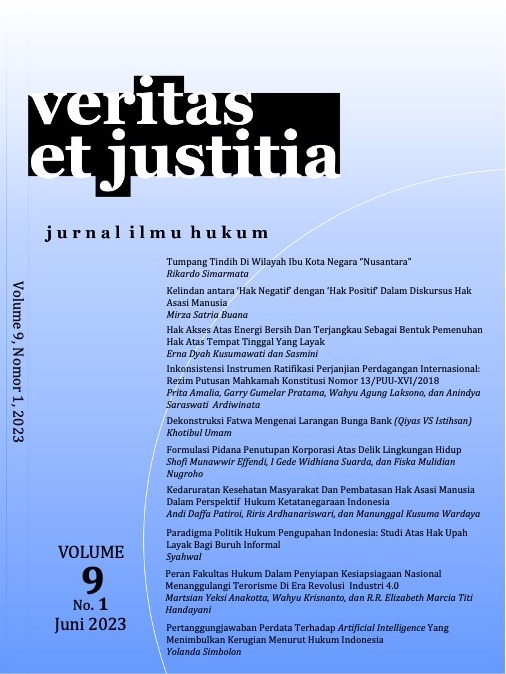KELINDAN ANTARA ‘HAK NEGATIF’ DENGAN ‘HAK POSITIF’ DALAM DISKURSUS HAK ASASI MANUSIA
DOI:
https://doi.org/10.25123/vej.v9i1.6042Keywords:
‘negative right’; ‘positive right’; human rights; right to development; comparative constitutional law;Abstract
This paper examines the conceptual dichotomy between ‘negative right’ and ‘positive right’ in the current discourse of human rights. The dichotomy has been embedded due to the historical description of generations of human rights, encompassing the civil and political rights that have liberalism influences, to the economic, social, and cultural rights that have socialist influences, and the last generation of rights being the collective and solidarity rights. This paper analyses the dichotomy from the standpoint of the right to development, with some pivotal approaches, including conceptual, case law, and comparative constitutional law approaches. It concludes that the dichotomy can only be used in a teaching and pedagogical setting of human rights, but the dichotomy cannot sustain the test in theoretical-conceptual and practical analyses.
References
Buku:
Bennett, Robert W dan Lawrence B. Solum, Constitutionalism Originalism: A Debate, Cornel University Press, 2011.
Brown, Gordon, The Universal Declaration of Human Rights in the 21st Century: A Living Document in Changing World, A Report by a Global Citizenship Commission, 2006.
Calabresi, Steven, The History and Growth of Judicial Review, Volume 2, OUP, Oxford, 2021.
Glendon, Mary A, Paolo G. Carazzo dan Colin B. Picker, Comparative Legal Traditions, Thomson/West, Boston, 1982.
Gregory, Roy dan Philips Giddings, Citizenship, Rights and the EU Ombudsman, dalam Richard Bellamy dan Alex Warleigh (eds), Citizenship and Governance in the European Union, Bloomsburry Academic, Glasgow, 2001.
Grimm, Dieter, Constitutionalism: Past, Present and Future, OUP, Oxford, 2016.
Jackson, Thomas, For Civil Rights to Human Rights: Martin Luther King Jr and the Struggle for Economic Justice, The University of Pennsylvania Press, Pennsylvania, 2009.
Kommers, Donald dan Miller, Russell, The Constitutional Jurisprudence of the Federal Republic of Germany, Duke University Press, Durham, 2012.
Legrand, Pierre, Negative Comparative Law: A Strong Programme for Weak Thought, OUP, Oxford, 2019.
Meron, Theodor, Human Rights in International Law: Legal and Policy Issues, Clarendon Press, Boston, 1989.
Riyadi, Eko, et al, Hukum Hak Asasi Manusia, UII Press, Yogyakarta, 2005.
Sen, Amartya, Human Rights and Development dalam B.A. Andreassen dan S.P. Marks (eds), Development as a Human Rights: Legal, Political and Economic Dimensions, a Nobel Symposium Book, Harvard University Press, Cambridge, 2006.
Sengupta, Arjun, Elements of a Theory of the Right to Development, dalam Basu K and Kanbur R (eds), Arguments for a Better World: Essay to Honour Amartya Sen, OUP, Oxford, 2009.
Sharom, Azmi et al, An Introduction to Human Rights in Southeast Asia, Volume I, SEAHRN, 2016.
UNDP, Integrating Human Rights with Sustainable Development, UNDP Policy Document 2, New York, 1998.
United Nations, An Agenda for Development: Report of the Secretary-General, UNDP Policy Document 2, UNDP, New York, 1994.
Zweigert, Konrad dan Hein Kötz, An Introduction to Comparative Law, diterjemahkan oleh Tony Weir, Oxford University Press, Oxford, 1999.
Jurnal:
Acharya, Upendra, The Future of Human Development: The Right to Survive as a Fundamental Element of the Right to Development, Denver Journal of International Law and Policy 42, 2014.
Domaradzki, Spasimir, ‘Karel Vasak’s Generations of Human Rights and the Contemporary Human Rights Discourse’, Human Rights Review 20, no. 4, 2019.
Eldridge, Philip. Human Rights in Post-Suharto Era, The Brown Journal of World Affairs IX, no. 1, 2002.
Hamilyn, Victoria. The Indivisibility of Human Rights: Economic, Social and Cultural Rights and the European Convention on Human Rights, Bracton Law Journal 40, no.1, 2008.
Petersen, Niels. The German Constitutional Court and Legislative Capture, International Journal of Constitutional Law 12, no.1, 2014.
Quint, Peter E, A Return to Lüth, Roger William University Law Review 16, no. 2, 2011.
Teitel, Ruti, Transitional Justice in New Era, Fordham International Law Journal 26, no. 4, 2002.
Uvin, Peter, From the Right to Development to the Right-based Approach, Development in Practice 17, no. 1, 2007.
Peraturan perundang-undangan:
Undang-Undang Dasar 1945 (Amandemen).
Undang-Undang Nomor 11 Tahun 2005 tentang Ratifikasi International Covenant on Economics, Social and Cultural Rights (ICESCR).
Undang-Undang Nomor 12 Tahun 2005 tentang Ratifikasi International Covenant on Civil and Political Rights (ICCPR).
Deklarasi, Kovenan dan Konvensi Internasional:
International Covenant on Civil and Political Rights (ICCPR), 1976.
International Covenant on Economics, Social and Cultural Rights (ICESCR), 1976.
Siracusa Principles on the Limitation and Derogation Provisions of Civil and Political Rights, 1985.
The Declaration of the Right to Development, G.A. Res. 41/128, U.N. Doc. A/RES/41/128, Dec. 4, 1986.
Putusan Pengadilan:
Putusan Pengadilan Mahkamah Konstitusi Federal Jerman, 7 BVferGE 198, 1958.
Putusan Mahkamah Agung Amerika Serikat, Brown v. Broad of Education, 347 U.S. 483, 1954.
Putusan Mahkamah Konstitusi Republik Indonesia Nomor 001-021-022/PUU-I/2003 tentang Uji Materiil Undang-Undang Kelistrikan.
Putusan Mahkamah Konstitusi Republik Indonesia Nomor 058-059-060-063/PUU-II/2004 tentang Uji Materiil Undang-Undang Pendidikan Nasional.
Putusan Mahkamah Konstitusi Republik Indonesia Nomor 011-012/PUU-III/2005 tentang Uji Materil Undang-Undang APBN.
Surat Kabar:
Sulistyowati Irianto, Putusan Hakim di Antara Keadilan Hukum dan Keadilan Sosial, Kompas, 28 Februari 2023.
Downloads
Published
Issue
Section
License
Copyright (c) 2023 Mirza Satria Buana

This work is licensed under a Creative Commons Attribution-NonCommercial 4.0 International License.
Authors who publish with this journal agree to the following terms:
Authors retain copyright and grant the journal right of first publication with the work simultaneously licensed under a Creative Commons Attribution License that allows others to share the work with an acknowledgement of the work's authorship and initial publication in this journal.
Authors are able to enter into separate, additional contractual arrangements for the non-exclusive distribution of the journal's published version of the work (e.g., post it to an institutional repository or publish it in a book), with an acknowledgement of its initial publication in this journal.
Authors are permitted and encouraged to post their work online (e.g., in institutional repositories or on their website) prior to and during the submission process, as it can lead to productive exchanges, as well as earlier and greater citation of published work.
The Journal allow the author(s) to hold the copyright and to retian publishing rights without restrictions.




